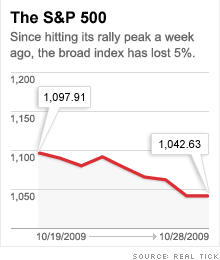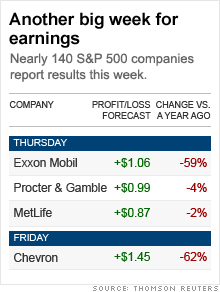Stocks slammed
A surprise drop in new home sales sends market lower, with the Nasdaq sliding for the fourth straight session, as investors question strength of the economic recovery.



NEW YORK (CNNMoney.com) -- Stocks tumbled Wednesday, led by the tech-fueled Nasdaq, as a weaker-than-expected new home sales report added to questions about the strength of the economic recovery.
The Dow Jones industrial average (INDU) lost 119 points, or 1.2%, to close at 9,762.69. The S&P 500 (SPX) index dropped 21 points, or 2%, to close at 1,042.63. The Nasdaq composite (COMP) tumbled 56 points, or 2.7%, to close at 2,059.61.
The Dow and S&P have fallen for three of the last four sessions, and the Nasdaq for all three, as investors have turned cautious following a seven-month stock rally.
Since bottoming at a 12-year low in March, the S&P 500 gained 63% through its peak on Oct. 19. But since then, it's lost 5%, as of Wednesday's close.
Enthusiasm about the largely better-than-expected quarterly earnings reports has been tempered recently by concerns about the still-burgeoning economic recovery.
"There's been some nervousness over the last week, and today the worry is that the weaker new home sales report means the consumer is still flat on its back," said Alan Gayle, senior investment strategist at RidgeWorth Investments.
Gayle said Wednesday's action shows investors are feeling less willing to take on risk at the moment, a factor made clear by the sector movement. In particular, the weakness in areas such as retail, financial and technology - and strength in defensive sectors like consumer staples and healthcare.
GDP: Thursday's reading on gross domestic product growth is the key economic event of the week. GDP is expected to have grown at a 3.2% annualized rate in the third quarter after shrinking at an 0.7% annualized rate in the second quarter.
GDP has declined steadily for four straight quarters, as Americans have contended with the worst recession since the Great Depression.
But the end of the recession doesn't necessarily mean a return to a period of robust growth, particularly amid rising joblessness and still-sluggish consumer spending. Government stimulus programs have played a big role in the recovery, and there are concerns about the strength of the system once that support winds down.
The weekly jobless claims report from the Labor Department is also due in the morning.
Housing: New home sales fell to a 402,000 unit annualized rate in September from a revised 417,000 unit annualized rate in August, the Commerce Department reported. Sales were expected to rise to a 440,000 unit annualized rate, according to a consensus of analysts surveyed by Briefing.com.
Durable goods: Orders for manufactured goods meant to last three years or more rose 1% in September, after falling 2.6% in the previous month. The rise was in line with estimates.
Goods excluding transportation rose 0.9% after falling 0.4% in August. Economists thought they would rise 0.7%.
Another report showed that fewer metro areas reported jobless rates above 10% in September than in the previous month.
GMAC seeks bailout: GMAC Financial Services is looking for a third bailout from the Treasury Department, according to a Wall Street Journal report. The lender is seeking between $2.8 billion and $5.6 billion, according to the Journal.
The U.S. owns a 35% stake in GMAC and has given it $13.4 billion since December 2008.
On the move: Financial and technology shares were among the hardest hit stocks Wednesday.
Dow financial components American Express (AXP, Fortune 500), Bank of America (BAC, Fortune 500) and JPMorgan Chase (JPM, Fortune 500) all declined. Wells Fargo (WFC, Fortune 500), Goldman Sachs (GS, Fortune 500) and Morgan Stanley (MS, Fortune 500) were among the other big bank shares sliding. The KBW Bank index slid 3.3%.
On the tech side, Intel (INTC, Fortune 500), Dell (DELL, Fortune 500), Apple (AAPL, Fortune 500) and Oracle (ORCL, Fortune 500) were among the big losers.
Telecom stocks gained, including Qwest Communications (Q, Fortune 500), which posted a higher-than-expected quarterly profit and lifted its full-year earnings forecast. Shares gained 2.6%.
Dow stock Verizon Communications (VZ, Fortune 500) rallied 3% after releasing more details about its iPhone challenging Droid smart phone - due for release next week. The phone uses Google's Android operating system, has a mini-keyboard and can run several applications at once. It is expected to retail for $199.
Fellow Dow telecom AT&T (T, Fortune 500) also gained, rising just short of 2%.
Currency and commodities: The dollar fell versus the euro, resuming its slide after a few up days and moving closer to a 14-month low hit last week. The greenback fell versus the yen.
U.S. light crude oil for December delivery fell $2.09 to settle at $77.46 a barrel on the New York Mercantile Exchange.
COMEX gold for December delivery fell $4.90 to settle at $1,030.50 an ounce. Gold has surpassed records repeatedly this month due to the weak dollar and longer-term worries about inflation.
World markets: Global markets tumbled. In Europe, London's FTSE 100, France's CAC 40 and Germany's DAX all lost over 2%. Asian markets ended lower.
Bonds: Treasury prices rose, lowering the yield on the 10-year note to 3.41% from 3.44% Tuesday. Treasury prices and yields move in opposite directions.
Prices held on to gains after the government sold $41 billion in five-year notes.
Market breadth was negative. On the New York Stock Exchange, losers beat winners nearly 9 to one on volume of 1.68 billion shares. On the Nasdaq, decliners topped advancers almost six to one on volume of 2.81 billion shares. ![]()



